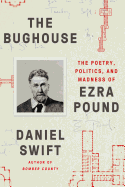
Ezra Pound is one of the most enigmatic of American poets. As early as 1916, Carl Sandburg suggested that Pound was both a "wanton and mocker, poseur, trifler and vagrant," and as important as "Keats [was] in a preceding epoch." In 1943, after hundreds of rambling anti-Semitic, pro-Mussolini, anti-war radio broadcasts in Italy, Pound was indicted for treason. A jury quickly concurred with his plea of insanity. Told in the first person by Daniel Swift (Shakespeare's Common Prayers), The Bughouse is the history of Pound's 12 years in Washington, D.C.'s Saint Elizabeths Hospital for the criminally insane. It is the story of a world-renowned poet gone off the rails--a poet known less for his rarely read 800 pages of "Cantos" than for his encouragement of fledgling poets, his advice to established stars like Hemingway and Cummings, and most famously, his line editing of Eliot's "The Waste Land."
While incarcerated in Saint Elizabeths' almost 300-acre campus with more than 7,000 other "patients," Pound skirted institutional restrictions to enjoy a steady stream of visiting poets like William Carlos Williams, Robert Lowell and T.S. Eliot. Immersed in the story, Swift walks the grounds of the long-closed hospital, combs archival letters and case files, and interviews as many surviving members of Pound's entourage as he can find. With an English professor's eye, he explicates many of the poet's pieces, and those of his visitors, to better understand the man and the milieu. Less interested in his polemics and "madness," Swift instead focuses on Pound's impact on emerging poets. He sees that time after time "a young man goes out to the bughouse and returns a poet." --Bruce Jacobs, founding partner, Watermark Books & Cafe, Wichita, Kan.

